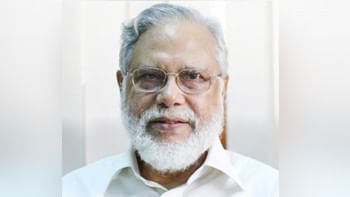Coronavirus threat: Tea workers’ say no to work

The tea workers of Shamshernagar Tea Garden in Kamalganj upazila, Moulvibazar, took matters into their own hands in defiance of the garden management and stopped work from March 27. Owned by Duncan Brothers, Shamshernagar Tea Garden is a big garden with 2,404 registered workers. Early in the morning of March 27, a group of some 50 members of panchayets, elders, and workers went to the manager of the tea garden to tell him that they want to stop work.
"We argued with the manager in reference to the Prime Minister's speech of March 25 and her instructions for everybody to stay at home," said Srikanta Kanu Gopal, general secretary of Shamshernagar main garden panchayet. "But the manager responded with a letter from the Deputy Director of Labour (DDL), Sreemangal, saying that the holiday is not applicable for tea workers. Our lives are more precious than tea. So, we have shut down the tea garden."
While the decisive action of panchayets and tea workers in Shamshernagar Tea Garden did not surprise Bangladesh Cha Sramik Union (BCSU), the lone union of nearly 100,000 registered tea workers, it was an embarrassment to Bangladesh Tea Association (BTA), which represents the owners of the tea gardens and the state.
BTA, with a circular of the Cabinet Division and the letter from the DDL in hand, has declined to stop operations of the tea gardens during the lockdown of the country from March 26 to April 4.
Shamsernagar Tea Garden also resumed its operations on March 30, with work hours up to 2pm. "The panchayets, UP members, and tea workers went to the manager to know if they will get wages and benefits if they do not work," reported Asha Ornal, joint general secretary of the panchayet committee of Shamshernagar Tea Garden (main). "Understanding that the manager cannot make this decision, we proposed to work half-day from 30 March while we wait for a decision from the upper level. We do not want the tea workers to starve."
The manager of Shamsernagar Tea Garden also corroborated this view, saying that the decision is not one that he can independently make, and that "we did not force anybody to work; the workers later joined work again."
On the other hand, the Sylhet Valley Committee of BCSU has shut down all 23 gardens in the district. "We have sent letters to all managers in these tea gardens," said Raju Guala, president of the Sylhet Valley Committee, "demanding full pay of wages and rations during the shutdown."
The BCSU, relatively weaker at the negotiation table compared to the government and owners, sent a letter to the DDL in Sreemangal on March 26—asking for the state and owners to take appropriate measures to shut down the tea gardens with full pay and ration to the tea workers—when it saw a press release from the Cabinet Division directing all government and non-government offices to shut down. The DDL, Sreemangal, gave a quick response the same day: "According to the press release of the Cabinet Division, these general holidays are not applicable for the tea workers."
The DDL, on a separate occasion, also said that the press release specifically says that manufacturers, distributors and traders of medicine, food and industries, institutions, markets and shops would run under their own management, and that the BTA said that they would run tea gardens under their own management since the government did not ask them to shut down operations. However, he said that they have asked all to ensure the safety and hygiene of workers during this period.
A topmost official of BTA, unwilling to be identified, confirmed that they are concerned but not prepared to shut down the tea gardens. "We are already beset with the falling prices of tea," he said. "And like the tea workers, we also need help. With production costs going up, it has become a big challenge for us to run the industry." The official said that the BTA will write to the appropriate government offices once the offices resume after April 4.
However, Rambhajan Kairi, general secretary of BCSU, observed that this action will be too late by then. "We, the workers and the communities in the labour lines, are in a state of fear in the current situation."
What is well demonstrated from the action of the tea workers in Shamshernagar Tea Garden and its four subsidiary gardens is that they do not have enough trust in BCSU's soft move and in the garden management. It is true that the tea gardens are away from our sight, in what seems to be a distant place. But what is evident from the work conditions in the tea gardens and that in the labour lines where tea workers and their communities live is that they must maintain social isolation among themselves, like the rest of the country. The following are some arguments in support of the tea workers, who work six days a week and now want to stay home and protect themselves.
First, the tea workers, particularly the female tea leaf pickers, work in groups. There are no toilets and washing facilities under a shade at the workplace, as provided for by labour laws. The water man (paniwala) brings mainly portable water to their workplace. Many workers drink water from the same glasses. Some drink water poured onto the palms of their hands, which are not properly washed or even washed at all. What can be more dangerous than this for the spreading of a pathogen?
Second, there is no toilet for the female tealeaf pickers who work all day in the garden. They have to defecate in the open if it becomes necessary. After defecation in the open, they generally do not wash their hands with soap.
Third, proper hand wash, the single most significant practice in the fight against coronavirus, is almost non-existent in the tea gardens. I phoned some workers to know about hand wash practices at this time; they report cut pieces of soap have been supplied by the management, but the water that the paniwala brings and the soap are both inadequate. They still eat their lunch with hands that are dirty from plucking tea leaf. They also eat their lunch in open spaces and in groups, sitting close to each other.
Fourth, at the time of collection of tea leaves, twice a day, a few hundred tea leaf pickers huddle together with their head-loads of tea leaves. This is still done, during a time when the most feared pathogen on the planet may spread.
Fifth, patta, or selling of local liquor, is seen in almost all tea gardens, and is no less concerning. Patta attracts visitors from nearby cities and local Bengali villages. The law enforcing agencies, administration, union councils and BCSU can work together to at least temporarily close all pattas and strictly restrict outside visitors from entering the tea gardens.
One may wonder what is right for the tea workers and tea gardens in Bangladesh at this moment. We may check what has been happening in Indian tea gardens at this time of crisis. According to a Times of India report, tea gardens in Assam have decided to shut down all its operations during the state lockdown. "Tea is no more an essential commodity and hence will not fall in the list of exempted services during a lockdown period," said Adviser of North Eastern Tea Association (NETA) Bidyananda Barkakoty in a statement. The Consultative Committee of Plantation Association (CCPA) has also announced that a tea garden lockdown is inevitable. However, essential services in Assam tea gardens will continue on a roster basis. Assam has at least 850 tea gardens employing two million workers, according to government records. While in Assam the owners, state government and trade unions have been working together for the safety of tea workers, what we see in Bangladesh is very sad. BTA, the counterpart of NETA in Assam, has taken a hardline stance on shutting down the tea gardens at the time of a global pandemic. We also do not see enough sympathy in the government agencies responsible for overseeing the wellbeing of tea workers.
What the panchayets and tea workers of Shamshernagar Tea Garden did on March 27, followed by other gardens in Moulvibazar district and finally, all gardens in the Sylhet division, demonstrate the desperation of the tea workers, who experience deprivation and neglect in their everyday life. It will not be surprising if workers shut down many more gardens as the days go by. The government offices are closed at this moment, as well as the BTA and BCSU offices. But we trust they can still discuss matters and take crucial policy decisions regarding shutting down the operations of tea gardens. We hope the tea workers can also be incorporated into the Tk 5,000 crore package announced by the government. A tiny slice from this amount will be sufficient to pay the wages of the tea workers during this emergency. The owners also have a responsibility so that the tea workers do not starve. Tea workers will volunteer to work according to a roster to prevent any permanent damage to the gardens, which is their lifeblood, but their concerns still need to be heard immediately.
Philip Gain is a researcher and director of the Society for Environment and Human Development (SEHD).

 For all latest news, follow The Daily Star's Google News channel.
For all latest news, follow The Daily Star's Google News channel. 



Comments